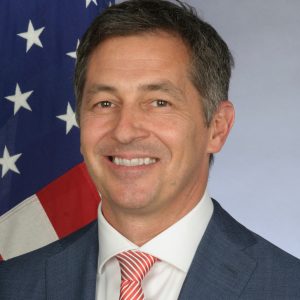When it comes to lesbian, gay, bisexual, transgender and intersex (LGBTI) rights in the region, the situation is something of a mixed bag. While anti-LGBTI sentiment has recently reached new heights of intolerance in Indonesia and transgender people in Myanmar regularly face harassment under the so-called ‘darkness law’, Vietnam recently started allowing same-sex unions and Thailand is widely seen as tolerant of same-sex couples. However, many people continue to face serious discrimination.

Randy Berry, a career diplomat with 23 years of experience in the US State Department, visited Taiwan, Vietnam, Thailand, Indonesia, Korea and Japan earlier this year to meet with government and civil society representatives on LGBTI issues.
Tell us about your trip to Southeast Asia.
It’s really important to engage with those who don’t agree with [inclusion]. For that reason we look for opportunities to have calm, rational conversations. We’re not there to wag fingers or to criticise, but just to talk clearly through some of the fundamental underpinnings of this. Sometimes that means representatives of religious communities that tend to be very conservative when talking about these issues. And other times it’s organisations. We’re not going to change anyone’s mind with force, but through talking and educating.
I’ve been meeting with representatives of multinational businesses. We are seeing increasing evidence that inclusion is being taken up within the business community, not as an issue of social responsibility but as an issue of productivity and an issue of profitability.
Indonesia has been in the news over LGBTI issues. Polls reveal that Indonesians are overwhelmingly opposed to homosexuality and some politicians are openly hostile to the LGBTI community. Can you comment?
From my perspective, Indonesia is a vast and diverse country that’s always thrived because of its diversity. Here’s an amazing opportunity to apply that [culture of diversity] to members of the LGBTI community.
Eventually I think that’s going to happen. I was impressed with the innovation and creativity of the civil society folks I met on my trip, and I believe ultimately they’ll steer this back around. For a movement to be successful, for this conversation to really matter, it has to take place indigenously. It’s not going to happen by imposition; it’s going to happen with honest dialogue. Where you see a strong civil society I always have hope. My sense is that in the long term we’ll see things turn around.
Thailand passed an anti-discrimination bill last year but still does not recognise same-sex unions. What message do you have to the government of Thailand in this respect?
The issue of equal protection, this is something that’s included in all of our founding documents. When we lay down these regulations, the intent is that our laws and our protections apply to all citizens. Do we know a thing or two about [LGBTI struggles] in the US? We do. It’s taken us a long time to get that over the course of our history in a number of different ways.
I would just advise to continue to take a look at the meaning of equality, the meaning of inclusion. I found the civil society actors in Thailand are very forward leaning. I think the adoption of the anti-discrimination bill is a good step. And there’s a general acknowledgement that there’s still work to be done in Thailand, just as there’s work to be done in the US.
What still needs to be done in Southeast Asia when it comes to LGBTI rights?
There’s a lot of work that still needs to be done in Southeast Asia, and also in the US as well. I think that we always need to be looking at a greater measure of equality.
In Taiwan, Vietnam and Japan, the conversation and the legal protections have moved beyond just ending violence and discrimination, which is where the focal point of our policy is seeded. It’s also moved to issues of families and relationships. There have been discussions about civil unions and marriage equality. It’s hard to predict how these things come about, but I’ve found in these three countries, in particular, there’s a very sophisticated movement.
I think this counters the notion that I hear all too often that LGBTI rights are simply Western issues being imposed as a cultural value. That’s total nonsense. We’re talking about basic freedoms and equality.


